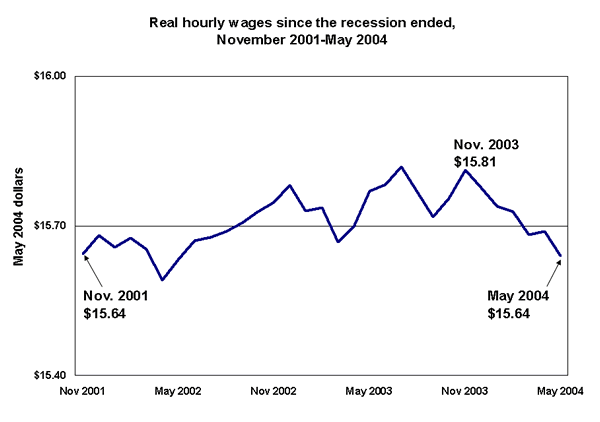See Snapshots Archive.
Snapshot for June 28, 2004.
Jobs up, wages down
Employment is growing again, but real wages fall to a two-year low
Just as the jobless recovery appears to be solidly behind us, a new problem has emerged: declining real wages. In fact, real wages for May fell back to the same level as November 2001, the month when the last recession ended.
The figure below shows the inflation-adjusted average hourly wage of blue-collar and non-managerial workers. Because this group represents all but the top 20% of the workforce, it is a good indicator of working- and middle-class job quality.

Wage trends turn slowly, and the figure shows that throughout the recession and jobless recovery, real wages grew fairly steadily, peaking in July of last year. Yet, since last November, real wages have fallen in all but one month and are down 1% in real terms for the period between November 2003 and May 2004 (the most recent data point). In fact, the May 2004 wage level of $15.64 was the lowest since May 2002.
Why have wages fallen behind inflation over the past six months? This question is particularly germane since employment growth has been far better over this period than at any time since the recession began in March 2001, up 1.2 million jobs since last November.
The main reason for poor wage growth is the lingering effect of the longest jobless recovery on record, which has left considerable slack in the labor market. Even though nominal wage growth has sped up a bit over the past two months—growing at an annual rate of 2.2% in April and May compared to an average of 1.7% over the prior two months—wage growth has clearly been reduced to a low rate because of years of job losses and high unemployment. In 2001, the average annual rate of nominal hourly wage growth was 3.8%; over the past 12 months, growth slowed to 2.2%. Thus, while the recent rise in inflation is partly to blame for the downward trend shown toward the end of the figure, the major culprit is slow nominal wage growth caused by persistent labor slack.
Until the labor market tightens, many employers will be unlikely to raise wages faster than inflation. It will thus take many more months of robust job growth before working families begin to share in the benefits of the recovery.
This Snapshot was written by EPI senior economist Jared Bernstein.
